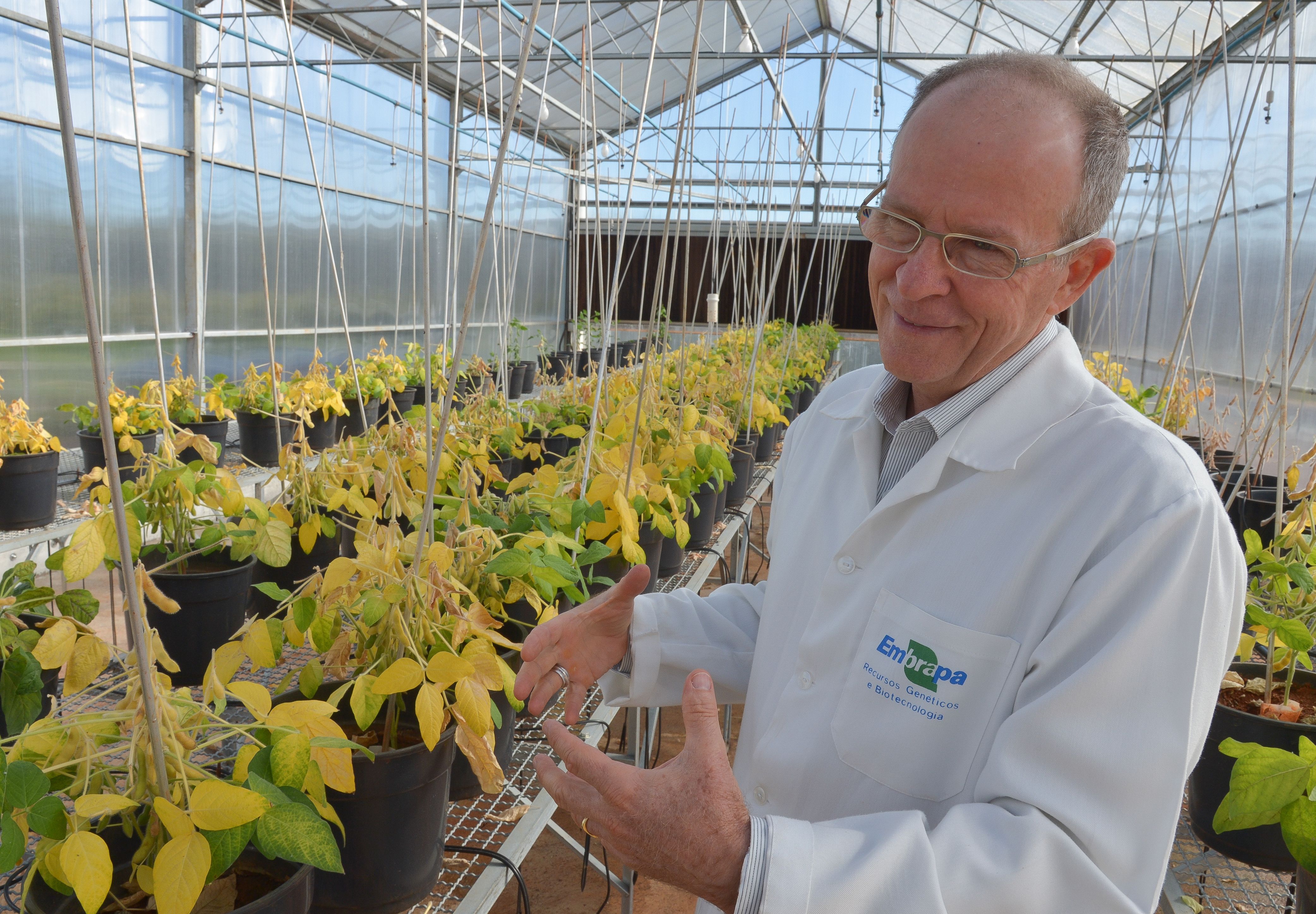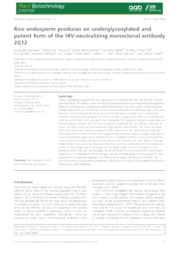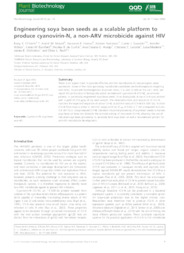Embrapa's research in partnership with USA, UK and South Africa receives international award
Embrapa's research in partnership with USA, UK and South Africa receives international award
Photo: Adilson Werneck

Elibio Rech with the genetically modified soybean plants at Embrapa's greenhouse, in Brasília, DF, Brazil.
Initiative that uses soybean plants as biofactories to produce protein that is efficient against HIV on a large scale was awarded by an American consortium of laboratories for excellency in technology transfer.
The research developed in partnership between Embrapa Genetic Resources and Biotechnology, the United States National Institute of Health (NIH), the University of London, and South Africa's Council for Scientific and Industrial Research (CSIR) received an award from the Federal Laboratory Consortium for Technology Transfer Mid-Atlantic Region (FLC MAR) in 2017 for excellency in technology transfer. The study managed to prove that genetically modified soybean seeds constitute the most efficient biofactory and a viable option for the large-scale production of cyanovirin - a protein extracted from seaweed that is very efficient in fighting AIDS.
The FLC is comprised of over 300 laboratories of famous American research and education institutions, such as the United States Department of Agriculture (USDA) and the Universities of Cornell, North Carolina and Maryland, among others. The consortium is divided into six regions: Far West, Midwest, Mid-Atlantic, Mid-Continent, Northeast, and Southeast.
The award will be handed out during the FLC MAR regional meeting on November 15, 2017, at the Universities at Shady Grove, in Maryland, USA. The researcher from Embrapa Genetic Resources and Biotechnology Elibio Rech, coordinator of the Brazilian participation in the studies, will receive the award, alongside the representatives of the other international institutions that participated in the project.
For Rech, besides the scientific recognition, this award proves the importance of technical cooperation for the development of cutting-edge research in the area of biotechnology. Not to mention promoting Embrapa in the international scientific scene. “This homage crowns a study that has taken more than a decade and obtained excellent results thanks to the partnership with international institutes”, he celebrates. The study had already been the subject of the section “Editor's choice” of the Science magazine in 2015.
It is worth noting that, on top of the innovation, the research has a strong humanitarian component, and thus developing countries with high rates of HIV contamination, such as some in Africa, for instance, will have a royalty-free license for domestic production and use. The continent has remained the most affected by the disease, especially in the Subsaharian region, where the problem is so serious that for every five deaths, one is as result of AIDS. According to data from the World Health Organization (WHO), in Zambia and South Africa, about 20% of all adult and young population has been contaminated with the virus.
In Brazil, according to UN estimates, new infections have risen 3% between 2010 and 2016, in contrast with the world average, which has declined by 11%.
Learn more about the awarded research
The research, which started in 2005, is based on introducing cyanovirin, a protein that is present in seaweed and that is capable of hindering the multiplication of the HIV virus in the human body, into genetically modified soybean seeds for large-scale production. The final aim is the development of a gel (with viricidal properties) so that women could apply it to their vaginas before sexual intercourse.
According to Rech, other biofactories like tobacco plants (N. tabacum and N. benthamiana), bacteris (E. coli) and yeast (S. cerevisiae) were tested. However, the only biofactory that has proved to be a viable option for cyanovirin production was the GM soybean seed because it allows the protein to be widely scaled up to suitable amounts. In addition, there is the benefit of the low cost of the investment required to produce the raw material to extract the molecule.
The researcher makes a point of emphasizing that the genetically modified seeds will not be planted in the fields. They will be cultivated in controlled and contained conditions of nurseries or greenhouses.
Biological factories for medicine production
He explains that the positive effect of cyanovirin, extracted from the blue-green seaweed Nostoc ellipsosporum, against AIDS had already been proven since 2008 from tests carried out with monkeys by the American institute. The protein's natural capacity of binding to sugars hindering the virus multiplication had already been known in the world's scientific community for over 15 years. “What was missing was the discovery of an efficient and economic way to produce the protein on a large scale”, he completes.
The use of plants, animals and microorganisms that are genetically modified for medicine production is part of a technological framework with which the researcher has been working since the 1990s. “The biological factories or biofactories are capable of expressing high value-added molecules at low costs, and therefore they are viable options for the production of inputs such as medicine and staple fiber that interest the industry, among others”, he asserts. Moreover, they further add value to Brazilian agribusiness, since they provide for value aggregation to agricultural products such as plants, animals and microorganisms. That is why he believes that the scenario in Brazil in 10 years will be completely influenced by biogenetics.
The revenue from biotechnology in the pharmaceutical industry worldwide has grown a lot in the last few decades and it has currently reached approximately 10 billion dollars a year. Biotechnological products are in frank development and today they represent about 10% of the new products currently available in the market.
By investing in research with biopharmaceuticals, Rech explains, Embrapa expects to have such drugs reach the pharmaceutical market with lower costs, since they are produced directly in plants, bacteria or milk. There is evidence that the use of biofactories can reduce the costs of producing recombinant protein by up to 50 times.
He states that the plants produce genetically modified proteins that are identical to the originals, with little investment of capital, resulting in safe products for the consumer. Moreover, they represent cheaper means for medicine production on a large scale, and since they are not subject to contamination, they prevent expenses with the purification of organisms that are potential causes of diseases in human beings. Not to mention easier storage and transportation.
Translation: Mariana Medeiros
Fernanda Diniz (MTb 4685/DF)
Embrapa Genetic Resources and Biotechnology
Press inquiries
cenargen.nco@embrapa.br
Phone number: +55 61 3448-4768
Further information on the topic
Citizen Attention Service (SAC)
www.embrapa.br/contact-us/sac/


